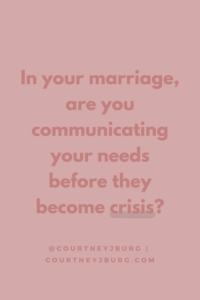The answer to this is a big, loud, resounding YES. Marriage is a life long bond that is meant to be built on trust, respect, and love. When any of those are out of whack, dysfunction follows. When you think of boundaries in a marriage, you’re probably envisioning “my shaving razor is mine, yours is yours,” which… that’s fair. However, I want to stress that boundaries in marriage far surpass just physical boundary needs. Boundaries of all kinds should help us with:
- Emotional well-being for everyone.
- Strengthened communication.
- Defining our roles.
- Managing conflict.
- Ensuring respect.
- Nurturing trust.
- And more…
And it all starts with communicating our needs before they become crisis. Let’s run through some example scenarios that will help us understand the importance of boundaries in a marriage:
Scenario 1
Your house just woke up, and everyone seems to be in a cranky mood, you included. In the span of 10 minutes, you have changed diapers, made multiple children breakfast, spilled milk everywhere, cleaned it up, loaded half of the dishes, remembered to write down an appointment on the calendar, and your coffee is now cold. Your husband is eating a bowl of cereal and reading a magazine at the table with the kids, and that does it… you explode!
“Can’t you see that I am running around like crazy trying to do all of the things and be all of the things right now, and you couldn’t even be BOTHERED to just get up for a moment help me?!”
Many of us have been there, and I am here to say how truly infuriating that feeling is. This is exhaustion and depletion at its finest, and as moms, we experience that quite often. Here is where it gets hard… if we had stopped and communicated our need, he would’ve known it existed. Our spouses, friends, family, and children are not mind-readers. Creating a life that is full of healthy boundaries also means you need to commit to sharing them and take responsibility for our own burnout when we choose not to. Instead of waiting until you are completely depleted, stop and say:
“I cannot finish this alone; I am exhausted. Here is what I have left, can we finish this together?” Then commit to having a conversation later around how to divvy up the morning in a more efficient way.
This scenario alone addresses emotional well-being (for both of you), strengthening communication of needs, defining your roles in that moment, managing conflict about this both now and in the future, ensuring you feel respected, and hopefully nurturing trust in bringing your needs to your spouse.
Scenario 2
Your husband has a group of friends that he has had since before you knew him. As time would have it, everyone in the group has grown up, several have spouses and families of their own, and everyone has very different views on life.
A few times a month, everyone gets together at your place, and that has been a staple point of this friendship for a little over 2 years now. You enjoy the group, but increasingly have less and less. A few of the wives seem to like to gossip about people you know in a way that makes you uncomfortable. The husbands make inappropriate jokes, and you or your kids are a periodic topic, and your husband laughs alongside his friends because he feels that it is harmless.
Now, several days in advance of the gatherings, you are anxious and snappy at your husband and your children. You are tired of leaving the event resentful with your husband for partaking in the jokes and exhausted by the wives who don’t seem to want to talk about anything other than your mutual friend. Not to mention, you are low on hours at work, and your budget is much tighter, and you’re the only one who spends money and cooks food, and it’s getting harder to fit it in – so you’ve left your kickboxing class to have the funds to make this happen.
Your first option is to not communicate your needs, limits, boundaries, and feelings to your husband because you don’t want to risk upsetting him (or his friends) and to chip away at your well-being month after month. Only resulting in a giant build-up of resentment, confusion, bitterness, and anxiety. Or it’s time to sit down and create boundaries to make this situation better for everyone! A few you start with: 1.) Don’t host at your home anymore but encourage others to take a turn 2.) Say that you are uncomfortable going if gossip or jokes are the main focus after you communicate your boundary to your friends 3.) Commit to them less frequently in a way that is safe for your budget and feels less overwhelming to you.
Scenario 3
This last one is much less a scene I want to set with you, but rather a fear that I know some women may have while reading this today. It is the scenario where you speak your boundary/limit/feeling/opinion and it is not well received or respected.
What if you share with your husband your level of burnout and content for his help in areas, and he laughs it off?
What if you say that you are not wanting to host the gatherings for friends anymore and he continues to invite them anyway?
Just because we want healthy boundaries, doesn’t mean that everyone does, and we are only responsible for ourselves at the end of the day. We can only ever control what is purely and completely within our control. I encourage you, if this is something that you fear – don’t keep yourself from trying. Not speaking up is the only path that leads 100% of the time to failure, and the man who married you likely wants to love you in this way! If you communicate your needs and get nowhere, then change what you can change.
- It is not selfish to leave the house or not spend time and money on cooking for a gathering your husband is having; that can be his gathering, and you can control where you are during that time. You can’t force him to not have them, like he cannot force you to stay – but in leaving, you find your anxiety lessens, you’re no longer snapping at him or the kids for the days leading up, and you have no more resentment afterwards.
- It is not unloving to eat dinner at 6 pm each day while it is still hot because your husband has been staying late at work to chat even after you had expressed how much you wanted him to be home to eat with as a family so that the children can have a bedtime that serves them. Marriage is a partnership, and it will always and forever take two. You can’t force him to come home; you get a meal that’s warm with the kids, and your days become easier when the children are well-rested because they go to sleep at 7 p.m. instead of 9 p.m.
What is in your control? What is not?
We don’t exist to make each other’s lives perfect; we exist in a messy life to make each other’s lives more beautiful. If you are feeling alone in this or don’t know where to start, be sure to check out my courses on Boundaries. You don’t have to do it alone!

Courses on Boundaries, Heal from Codependency, Stewardship, and Rising Daughters are all available immediately for access to every active DYW member. Not only do you receive the self-paced video courses, but you get access to a monthly masterclass (including all the previous ones), bonus content, and email support with me.
Don’t wait… Join us today!
Now is the time to Discover Your Worth.



